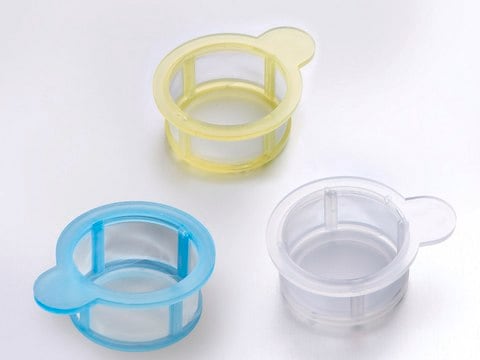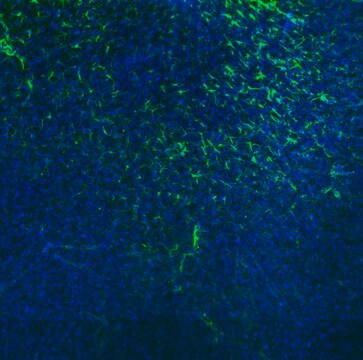2170
ChemiBLOCKER
Sinónimos:
Blocking Reagent
Iniciar sesiónpara Ver la Fijación de precios por contrato y de la organización
About This Item
UNSPSC Code:
41116010
eCl@ss:
42029053
Productos recomendados
packaging
pkg of 1 L
manufacturer/tradename
ChemiBlock
Chemicon®
technique(s)
ELISA: suitable
immunohistochemistry: suitable
western blot: suitable
shipped in
wet ice
General description
The ChemiBLOCKER is an unique membrane-blocking agent. As a non-animal protein blocker it offers an alternative to milk-based blocking agents, minimizing the risk of non-specific binding of antibodies to your membrane and lowering your background. ChemiBLOCKER may be used at dilutions as high as 20x but for most applications, a 5 to 10 fold dilution is appropriate. ChemiBLOCKER is biotin free and will not interfere with ABC detection systems. ChemiBLOCKER does contain phosphates and may not be suitable for use with some phospho-specific antibodies.
Related Products:
• BLOT-QuickBlocker A novel blocking protein which produces a semi-clear solution. This allows users the option to examine their blot membranes during the blocking procedure. 200g Catalog Number 2080
• Femto/TBST wash buffer (10X) 250mL Catalog Number 2081
Materials required:
• 1X femto/TBST (Catalog Number 2081), 1X TBST, or 1X PBST
• primary and secondary antibodies
• reagents for immunodetection
Related Products:
• BLOT-QuickBlocker A novel blocking protein which produces a semi-clear solution. This allows users the option to examine their blot membranes during the blocking procedure. 200g Catalog Number 2080
• Femto/TBST wash buffer (10X) 250mL Catalog Number 2081
Materials required:
• 1X femto/TBST (Catalog Number 2081), 1X TBST, or 1X PBST
• primary and secondary antibodies
• reagents for immunodetection
Application
Western Blot
ELISA
PROTOCOL:
1. Make up blocking solution by mixing 1 part ChemiBLOCKER with 1 part 1X femto-TBST/PBST (TBST or PBST also work) for blocking PVDF membranes. For nitrocellulose membranes, mix 1 part ChemiBLOCKER with 3 parts 1X femto-TBST (TBST or PBST also work). Note:ChemiBLOCKER can be used at a wide variety of dilutions, some optimization may be necessary. ChemiBLOCKER is NOT recommended for phospho-protein studies as it does contain phosphorylated proteins.
2. Incubate the membrane in blocking solution (10-20 mL) for 60 minutes at room temperature with shaking in a heat-sealable plastic bag.
3. Prepare antibody dilution buffer (ADB). For PVDF membranes mix 1 part ChemiBLOCKER with 3 parts 1X femto-TBST/PBST (TBST or PBST also work). Incubate the membrane in 5-10 mL primary antibody, diluted appropriately with ADB, for 90 min at room temperature with shaking.
4. Wash the membrane 3 times in 50 mL of 1X femto-TBST (TBST or PBST also work) for 5 min each time at room temperature with shaking.
5. Incubate the membrane in 5-10 mL secondary antibody, diluted appropriately with ADB, for 90 min at room temperature with shaking.
6. Wash the membrane as in step #4, but add one extra wash (4 washes total).
7. Wash the membrane 3 times quickly (30 sec.) in 50 mL pure deionized water each time and then process the blot, using femto-LUCENT detection system (or your favorite system).
ELISA
PROTOCOL:
1. Make up blocking solution by mixing 1 part ChemiBLOCKER with 1 part 1X femto-TBST/PBST (TBST or PBST also work) for blocking PVDF membranes. For nitrocellulose membranes, mix 1 part ChemiBLOCKER with 3 parts 1X femto-TBST (TBST or PBST also work). Note:ChemiBLOCKER can be used at a wide variety of dilutions, some optimization may be necessary. ChemiBLOCKER is NOT recommended for phospho-protein studies as it does contain phosphorylated proteins.
2. Incubate the membrane in blocking solution (10-20 mL) for 60 minutes at room temperature with shaking in a heat-sealable plastic bag.
3. Prepare antibody dilution buffer (ADB). For PVDF membranes mix 1 part ChemiBLOCKER with 3 parts 1X femto-TBST/PBST (TBST or PBST also work). Incubate the membrane in 5-10 mL primary antibody, diluted appropriately with ADB, for 90 min at room temperature with shaking.
4. Wash the membrane 3 times in 50 mL of 1X femto-TBST (TBST or PBST also work) for 5 min each time at room temperature with shaking.
5. Incubate the membrane in 5-10 mL secondary antibody, diluted appropriately with ADB, for 90 min at room temperature with shaking.
6. Wash the membrane as in step #4, but add one extra wash (4 washes total).
7. Wash the membrane 3 times quickly (30 sec.) in 50 mL pure deionized water each time and then process the blot, using femto-LUCENT detection system (or your favorite system).
Packaging
sufficient for 100 mini gel blots
Components
2X ChemiBLOCKER 1 L
Physical form
A 2X solution of non-animal proteins in 2mM TRIS, pH 8.5, 100mM NaCl, 0.001% Tween-20, and 0.08% Kathon added as a preservative.
Storage and Stability
Store kit components at 2-8°C for up to 1 year from date of purchase. Warm ChemiBLOCKER to room temperature and mix thoroughly before dispensing. To avoid possible microbial contamination, dispense all solutions aseptically. Over time, phenolic compounds may precipitate out of solution resulting in the formation of a small amount of dark brown to black particulate material at the bottom of the container. This material will not affect the performance of the blocking compound.
Legal Information
CHEMICON is a registered trademark of Merck KGaA, Darmstadt, Germany
signalword
Warning
hcodes
Hazard Classifications
Aquatic Chronic 2 - Eye Irrit. 2 - Skin Irrit. 2 - Skin Sens. 1
Storage Class
12 - Non Combustible Liquids
wgk_germany
WGK 3
flash_point_f
Not applicable
flash_point_c
Not applicable
Certificados de análisis (COA)
Busque Certificados de análisis (COA) introduciendo el número de lote del producto. Los números de lote se encuentran en la etiqueta del producto después de las palabras «Lot» o «Batch»
¿Ya tiene este producto?
Encuentre la documentación para los productos que ha comprado recientemente en la Biblioteca de documentos.
Multiplex human papillomavirus serology based on in situ-purified glutathione s-transferase fusion proteins
Waterboer, Tim, et al
Clinical Chemistry, 51, 1845-1853 (2005)
Widespread thalamic terminations of fibers arising in the superficial medullary dorsal horn of monkeys and their relation to calbindin immunoreactivity.
Graziano, Alessandro and Jones, Edward G
The Journal of Neuroscience, 24, 248-256 (2004)
Nuestro equipo de científicos tiene experiencia en todas las áreas de investigación: Ciencias de la vida, Ciencia de los materiales, Síntesis química, Cromatografía, Analítica y muchas otras.
Póngase en contacto con el Servicio técnico







